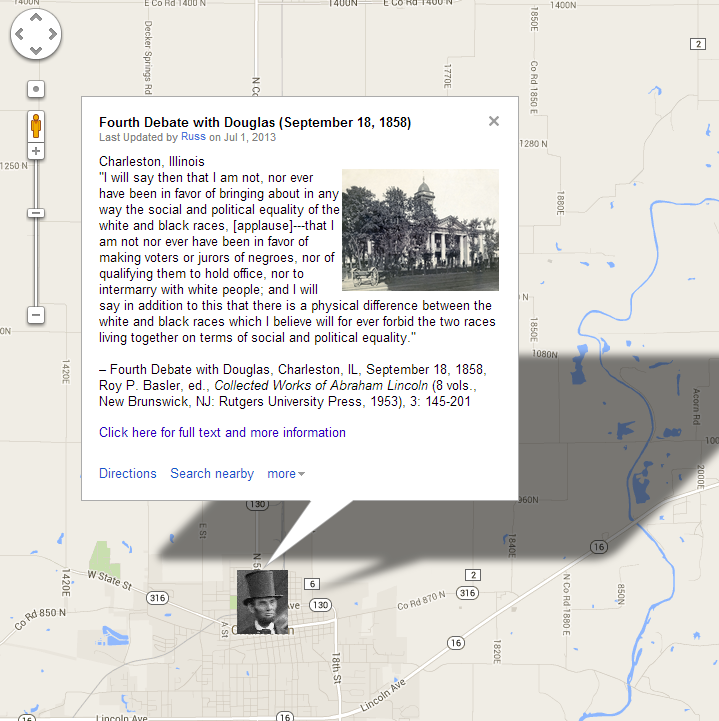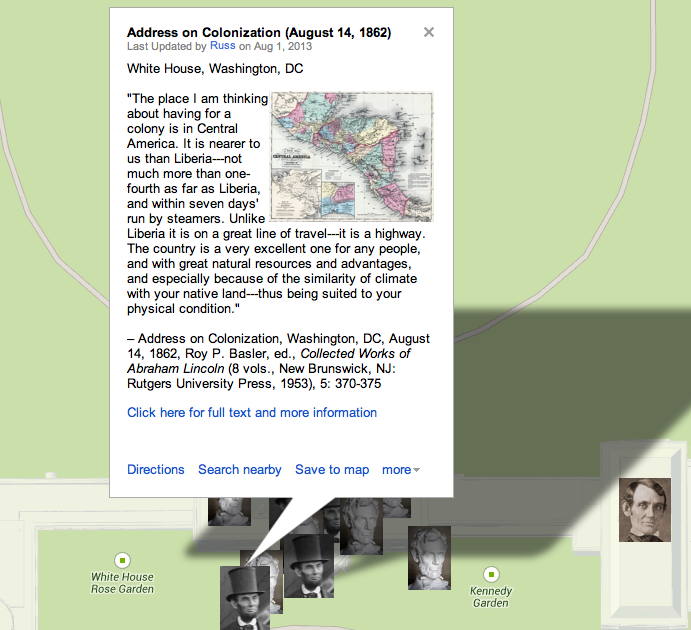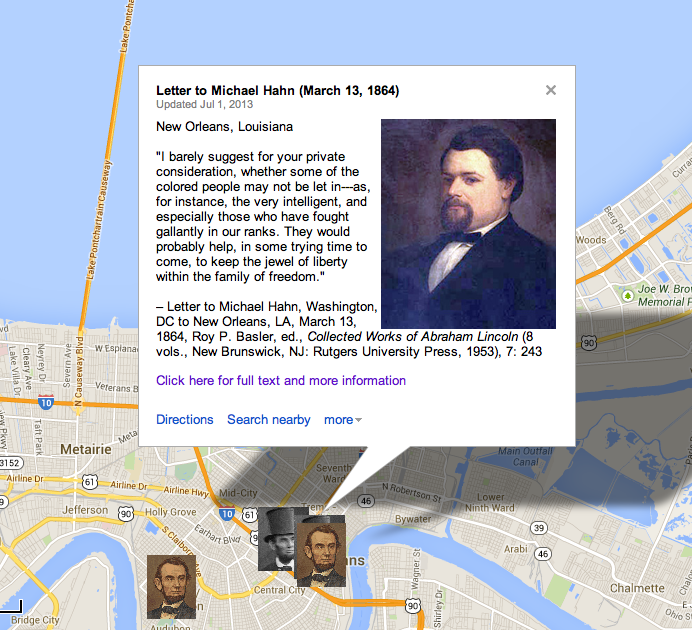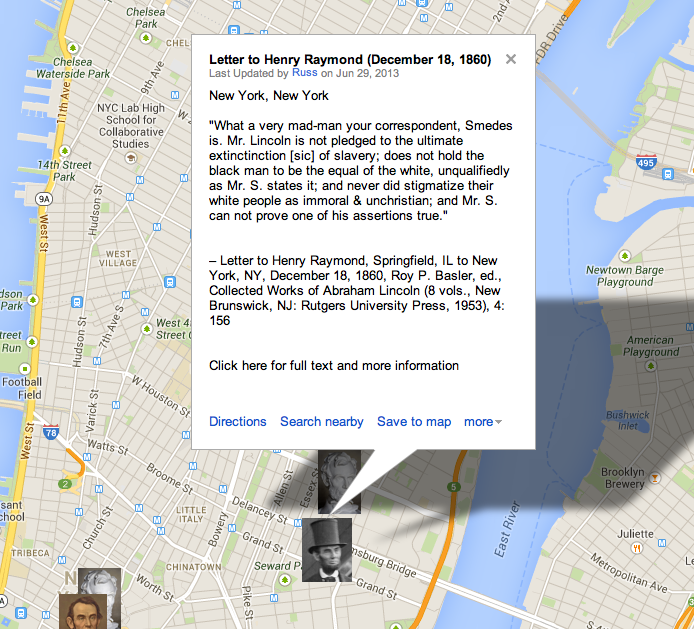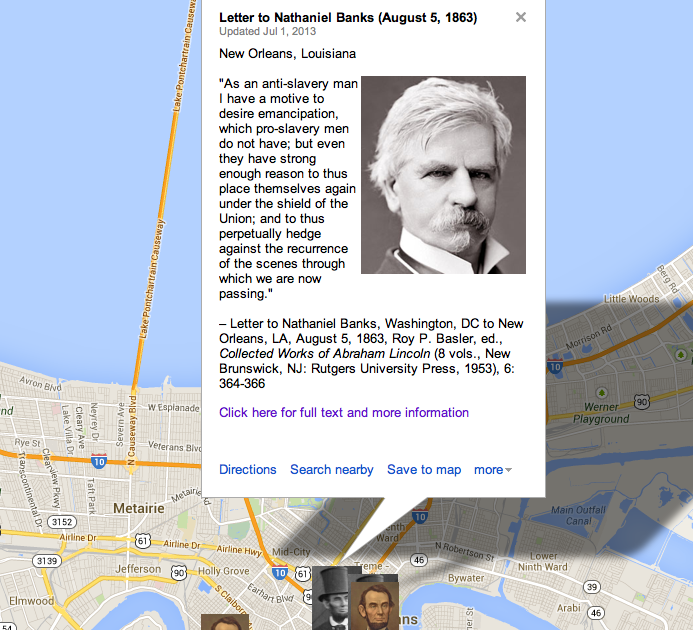Contributing Editors for this page include Martin Buchman
Ranking
#26 on the list of 150 Most Teachable Lincoln Documents
Annotated Transcript
“When a man hears himself somewhat misrepresented, it provokes him-at least, I find it so with myself…”
Audio Version
On This Date
HD Daily Report, August 21, 1858
The Lincoln Log, August 21, 1858
Close Readings
Martin Buchman, “Understanding Lincoln” blog post (via Quora), August 22, 2013
How Historians Interpret
“The following day Lincoln described the debate to a friend: ‘the fur flew some, and I am glad to know I am yet alive. There was a vast concourse of people – more than could [get] near enough to hear.’ Years later, he told a friend that of all his speeches during the 1858 campaign, ‘I was better pleased with myself at Ottawa than at any other place.'”
—Michael Burlingame, Abraham Lincoln: A Life (2 volumes, originally published by Johns Hopkins University Press, 2008) Unedited Manuscript By Chapter, Lincoln Studies Center, Volume 1, Chapter 13 (PDF), p. 1367
“The highly partisan papers concocted contradictory pictures of crowd response and outcome. At the end of the first debate, the Republican Chicago Press and Tribune reported that ‘when Mr. Lincoln walked down from the platform, he was seized by the multitude and borne off on their shoulders, in the center of a crowd of five thousand shouting Republicans, with a band of music in front.’ Observing the same occasion, the Democratic Chicago Times claimed that when it was over, Douglas’s ‘excoriation of Lincoln’ had been so successful and ‘so sever, that the republicans hung their heads in shame.’”
— Doris Kearns Goodwin, Team of Rivals: The Political Genius of Abraham Lincoln, (New York: Simon and Schuster, 2006), p. 201
“Professor Fredrickson also points out that we should devote careful attention to what Lincoln claimed for the Negro in the Ottawa address. Despite the differences he saw between the races, Lincoln did hold that there was ‘no reason in the world why the negro is not entitled to all the natural rights enumerated in the Declaration of Independence, the right to life, liberty and the pursuit of happiness.’ Judged within the context of his own times, Lincoln, as Fredrickson notes, occupied a middle position between those who, like Douglas, would deny the Negro every human right and the small group of abolitionists who supported the radical doctrine of racial equality.”
—Arthur Zilversmit, “Lincoln and the Problem of Race: A Decade of Interpretations”, Journal of the Abraham Lincoln Association 2, 1980.
NOTE TO READERS
This page is under construction and will be developed further by students in the new “Understanding Lincoln” online course sponsored by the House Divided Project at Dickinson College and the Gilder Lehrman Institute of American History. To find out more about the course and to see some of our videotaped class sessions, including virtual field trips to Ford’s Theatre and Gettysburg, please visit our Livestream page at http://new.livestream.com/gilderlehrman/lincoln
Custom Map
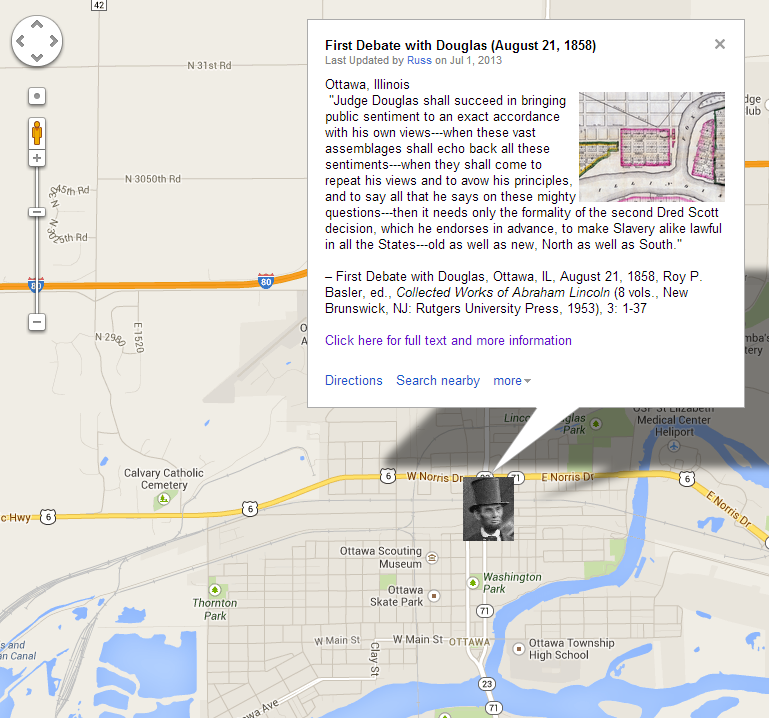
View larger map
Searchable Text
First Debate with Stephen Douglas (August 21, 1858)
When a man hears himself somewhat misrepresented, it provokes him-at least, I find it so with myself; but when misrepresentation becomes very gross and palpable, it is more apt to amuse him. The first thing I see fit to notice, is the fact that Judge Douglas alleges, after running through the history of the old Democratic and the old Whig parties, that Judge Trumbull and myself made an arrangement in 1854, by which I was to have the place of Gen. Shields in the United States Senate, and Judge Trumbull was to have the place of Judge Douglas. Now, all I have to say upon that subject is, that I think no man-not even Judge Douglas-can prove it, because it is not true. [Cheers.] I have no doubt he is “conscientious” in saying it. [Laughter.] As to those resolutions that he took such a length of time to read, as being the platform of the Republican party in 1854, I say I never had anything to do with them, and I think Trumbull never had. [Renewed laughter.] Judge Douglas cannot show that either of us ever did have anything to do with them. I believe this is true about those resolutions: There was a call for a Convention to form a Republican party at Springfield, and I think that my friend, Mr. Lovejoy, who is here upon this stand, had a hand in it. I think this is true, and I think if he will remember accurately, he will be able to recollect that he tried to get me into it, and I would not go in. [Cheers and laughter.] I believe it is also true that I went away from Springfield when the Convention was in session, to attend court in Tazewell county. It is true they did place my name, though without authority, upon the committee, and afterward wrote me to attend the meeting of the committee, but I refused to do so, and I never had anything to do with that organization. This is the plain truth about all that matter of the resolutions.
Now, about this story that Judge Douglas tells of Trumbull bargaining to sell out the old Democratic party, and Lincoln agreeing to sell out the old Whig party, I have the means of knowing about that; Judge Douglas cannot have; and I know there is no substance to it whatever. Yet I have no doubt he is “conscientious” about it. I know that after Mr. Lovejoy got into the Legislature that winter, he complained of me that I had told all the old Whigs of his district that the old Whig party was good enough for them, and some of them voted against him because I told them so. Now, I have no means of totally disproving such charges as this which the Judge makes. A man cannot prove a negative, but he has a right to claim that when a man makes an affirmative charge, he must offer some proof to show the truth of what he says. I certainly cannot introduce testimony to show the negative about things, but I have a right to claim that if a man says he knows a thing, then he must show how he knows it. I always have a right to claim this, and it is not satisfactory to me that he may be “conscientious” on the subject. [Cheers and Laughter.]
Now, gentlemen, I hate to waste my time on such things, but in regard to that general Abolition tilt that Judge Douglas makes, when he says that I was engaged at that time in selling out and abolitionizing the old Whig party-I hope you will permit me to read a part of a printed speech that I made then at Peoria, which will show altogether a different view of the position I took in that contest of 1854.
VOICE-“Put on your specs.”
MR. LINCOLN-Yes, sir, I am obliged to do so. I am no longer a young man. [Laughter.]
“This is the repeal of the Missouri Compromise. The foregoing history may not be precisely accurate in every particular; but I am sure it is sufficiently so for all the uses I shall attempt to make of it, and in it we have before us, the chief materials enabling us to correctly judge whether the repeal of the Missouri Compromise is right or wrong.
“I think, and shall try to show, that it is wrong; wrong in its direct effect, letting slavery into Kansas and Nebraska-and wrong in its prospective principle, allowing it to spread to every other part of the wide world, where men can be found inclined to take it.
“This declared indifference, but, as I must think, covert real zeal for the spread of slavery, I cannot but hate. I hate it because of the monstrous injustice of slavery itself. I hate it because it deprives our republican example of its just influence in the world-enables the enemies of free institutions, with plausibility, to taunt us as hypocrites-causes the real friends of freedom to doubt our sincerity, and especially because it forces so many really good men amongst ourselves into an open war with the very fundamental principles of civil liberty-criticizing the Declaration of Independence, and insisting that there is no right principle of action but self-interest.
“Before proceeding, let me say I think I have no prejudice against the Southern people. They are just what we would be in their situation. If slavery did not now exist among them, they would not introduce it. If it did now exist amongst us, we should not instantly give it up. This I believe of the masses North and South. Doubtless there are individuals on both sides, who would not hold slaves under any circumstances; and others who would gladly introduce slavery anew, if it were out of existence. We know that some Southern men do free their slaves, go North, and become tiptop Abolitionists; while some Northern ones go South, and become most cruel slave-masters.
“When Southern people tell us they are no more responsible for the origin of slavery than we, I acknowledge the fact. When it is said that the institution exists, and that it is very difficult to get rid of it, in any satisfactory way, I can understand and appreciate the saying. I surely will not blame them for not doing what I should not know how to do myself. If all earthly power were given me, I should not know what to do, as to the existing institution. My first impulse would be to free all the slaves, and send them to Liberia,-to their own native land. But a moment’s reflection would convince me, that whatever of high hope, (as I think there is) there may be in this, in the long run, its sudden execution is impossible. If they were all landed there in a day, they would all perish in the next ten days; and there are not surplus shipping and surplus money enough in the world to carry them there in many times ten days. What then? Free them all, and keep them among us as underlings? Is it quite certain that this betters their condition? I think I would not hold one in slavery at any rate; yet the point is not clear enough to me to denounce people upon. What next? Free them, and make them politically and socially our equals? My own feelings will not admit of this; and if mine would, we well know that those of the great mass of white people will not. Whether this feeling accords with justice and sound judgment, is not the sole question, if, indeed, it is any part of it. A universal feeling, whether well or ill-founded, cannot be safely disregarded. We cannot, then, make them equals. It does seem to me that systems of gradual emancipation might be adopted; but for their tardiness in this, I will not undertake to judge our brethren of the South.
“When they remind us of their constitutional rights, I acknowledge them, not grudgingly, but fully and fairly; and I would give them any legislation for the reclaiming of their fugitives, which should not, in its stringency, be more likely to carry a free man into slavery, than our ordinary criminal laws are to hang an innocent one.
“But all this, to my judgment, furnishes no more excuse for permitting slavery to go into our own free territory, than it would for reviving the African slave-trade by law. The law which forbids the bringing of slaves from Africa, and that which has so long forbid the taking of them toNebraska, can hardly be distinguished on any moral principle; and the repeal of the former could find quite as plausible excuses as that of the latter.”
I have reason to know that Judge Douglas knows that I said this. I think he has the answer here to one of the questions he put to me. I do not mean to allow him to catechise me unless he pays back for it in kind. I will not answer questions one after another, unless he reciprocates; but as he has made this inquiry, and I have answered it before, he has got it without my getting anything in return. He has got my answer on the Fugitive Slave law.
Now, gentlemen, I don’t want to read at any greater length, but this is the true complexion of all I have ever said in regard to the institution of slavery and the black race. This is the whole of it, and anything that argues me into his idea of perfect social and political equality with the negro, is but a specious and fantastic arrangement of words, by which a man can prove a horse-chestnut to be a chestnut horse. [Laughter.] I will say here, while upon this subject, that I have no purpose, directly or indirectly, to interfere with the institution of slavery in the States where it exists. I believe I have no lawful right to do so, and I have no inclination to do so. I have no purpose to introduce political and social equality between the white and the black races. There is a physical difference between the two, which, in my judgment, will probably forever forbid their living together upon the footing of perfect equality, and inasmuch as it becomes a necessity that there must be a difference, I, as well as Judge Douglas, am in favor of the race to which I belong having the superior position. I have never said anything to the contrary, but I hold that, notwithstanding all this, there is no reason in the world why the negro is not entitled to all the natural rights enumerated in the Declaration of Independence, the right to life, liberty, and the pursuit of happiness. [Loud cheers.] I hold that he is as much entitled to these as the white man. I agree with Judge Douglas he is not my equal in many respects-certainly not in color, perhaps not in moral or intellectual endowment. But in the right to eat the bread, without the leave of anybody else, which his own hand earns, he is my equal and the equal of Judge Douglas, and the equal of every living man. [Great applause.]


